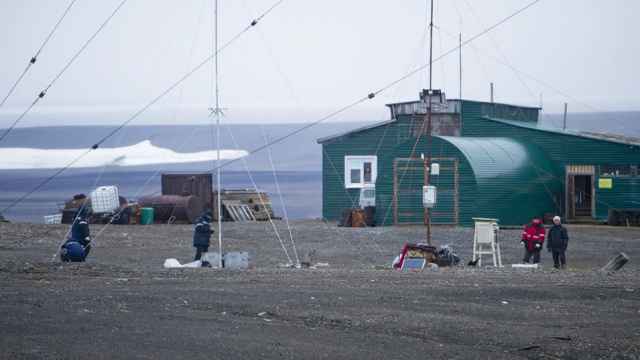An ecologist in northern Russia said Thursday the state nuclear agency Rosatom had committed a crime by carrying out a mysterious test last week close to inhabited areas, which caused a spike in radiation in his native city.
Rosatom has said that the Aug. 8 accident occurred during a rocket test involving "isotope power sources" that was carried out on a sea platform in the White Sea. At least five people were killed in the accident.
The Defense Ministry initially said radiation levels had remained normal, but officials in the northern city of Severodvinsk recorded a brief spike. Days later, the state weather agency said radiation had risen by up to 16 times.
"To carry out (this test) without preparing or warning the local population and not to take into account the ecological risks — of course it's a crime," Alexei Klimov, an ecologist from Severodvinsk, said.
He said the test was carried out when the wind was blowing towards Severodvinsk which, like neighboring Arkhangelsk, is located on the bay where the test was conducted. The cities have a combined population of more than half a million.
"Children were strolling on the sea front. No one issued a warning. We should have been warned," Klimov said, adding that the test should have been done at one of Russia's remote test sites.
A spokesman for Rosatom declined to comment on Klimov’s allegation, but said the test had posed no risk to residents in Severodvinsk or elsewhere.
Klimov said local residents had filed a complaint to prosecutors to look into the circumstances of the test and were gathering signatures to demand that such tests are never carried out again.
It remains unclear what Russia was actually testing and some analysts have said there is still not enough information available to make a clear call.
U.S. President Donald Trump said on Twitter on Monday the United States was "learning much" from the explosion which he suggested happened during the testing of a nuclear-powered cruise missile vaunted by President Vladimir Putin last year.
Russia, which has said the missile will have an "unlimited range" and be able to overcome any defenses, calls the missile the 9M730 Burevestnik (Storm Petrel). The NATO alliance has designated it the SSC-X-9 Skyfall.
The pro-Kremlin Izvestia newspaper, however, disputed any connection with the Burevestnik on Thursday and said the authorities had been testing an advanced booster device.
It said the device featured a liquid propellant rocket engine mounted with "nuclear batteries" — military jargon Izvestia said was used to describe new isotope sources of power.
A Message from The Moscow Times:
Dear readers,
We are facing unprecedented challenges. Russia's Prosecutor General's Office has designated The Moscow Times as an "undesirable" organization, criminalizing our work and putting our staff at risk of prosecution. This follows our earlier unjust labeling as a "foreign agent."
These actions are direct attempts to silence independent journalism in Russia. The authorities claim our work "discredits the decisions of the Russian leadership." We see things differently: we strive to provide accurate, unbiased reporting on Russia.
We, the journalists of The Moscow Times, refuse to be silenced. But to continue our work, we need your help.
Your support, no matter how small, makes a world of difference. If you can, please support us monthly starting from just $2. It's quick to set up, and every contribution makes a significant impact.
By supporting The Moscow Times, you're defending open, independent journalism in the face of repression. Thank you for standing with us.
Remind me later.






